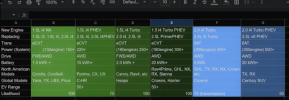internalaudit
Expert
- Messages
- 1,228
- Reactions
- 1,180
I wonder what kind of Toyota/Lexus PHEVs snd BEVs will be out in three to four years' time.
2027/28 is when Toyota expects solid state batteries to be in its vehicles. Prior to that, bipolar designs.
For people who can charge at home or work inexpensively, and already have or will have an ICEV or HEV, it will probably be time to consider BEVs if only for longer powertrain warranty along the entire performance spectrum.
2027/28 is when Toyota expects solid state batteries to be in its vehicles. Prior to that, bipolar designs.
For people who can charge at home or work inexpensively, and already have or will have an ICEV or HEV, it will probably be time to consider BEVs if only for longer powertrain warranty along the entire performance spectrum.

